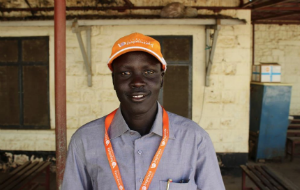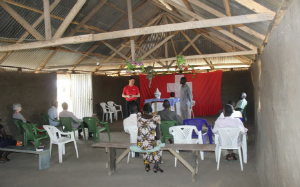Baptist church service in war-torn South Sudan
Baptist World Aid's Rescue 24 team, operated by Hungarian Baptist Aid (HBAid), was invited by the Government of South Sudan to help victims of the conflict that broke out in December 2013. The team included Dávid Gál, HBAid's Director of International Programs, who wrote this account of a visit to a Baptist church in Juba
I met Yai Kiir Dau, a young South Sudanese evangelist, at the training hospital of Juba. The Hungarian Baptist medical team had already been here for a week, caring for the patients who were injured during the conflicts in December.

This sincere young man said that the Baptist Centre in the capital was closed and its leadership fled. The presidency of the Baptists travelled to neighbouring Kenya at the end of December, and most of them didn’t dare to return since then.
Yai Kiir (pictured) also said that he planted a church at a district called “New Site” in Juba three years ago, a ministry of the Faith Evangelical Baptist Church of South Sudan. More than 100 people used to attend the church, but now only eight to ten people come on Sundays: most women and children have evacuated to the border regions, neighbouring countries or UN camps.
He told me about his vision, that churches need to be planted, and educational programs started, so children will see options other than the military career. I promised that we would visit his church.
'New Site? You can’t go there, I won’t take you there,' the driver, who was assigned to us by the Ministry of Health, told us. 'The entire conflict started there, when the first fights broke out,' he added. According to the hospital’s director, 'New Site is like a ghost city, and you have nothing to do there.'
On Sunday morning, I called Yai with a bad feeling and told him that we wouldn’t be able to visit his church as we were not allowed to go to that region. So we drove to the hospital instead.
The morning was slow, not many things were happening. I felt uneasy, I sensed that I wasn’t at the right place. I called the driver: 'Would you take me to the church service? I will stay there just for twenty minutes and we can leave.'
Reluctantly, he agreed to take me to New Site. When I told my plan to the two Hungarian doctors, they immediately stated that they were also coming.
We were all tense during the short drive. We left the modest city centre and a poor tin-roofed shanty district behind. We also passed by the airport. 'This is already New Site,' said the driver. Alongside the road, there were simple military barracks, a paved army shooting range, and a training centre. If we had gone further, we would have arrived at the Ministry of Defense.

“New Site” was established for the soldiers of the government and their families after the South Sudan’s independence in 2011. Beyond the barracks there were small shops, herds of cattle and heather-topped huts plastered with mud. Besides the main road, there weren’t any concrete roads, only sandy dirt ones. There were all kind of soldiers in their uniforms and also some civilians, but life looked rather slow as most people have fled, and many houses stood empty.
Yai came to meet us on a borrowed motorcycle, and guided us deep inside the settlement to the small Baptist church. The building was new, but on the mud plastered walls there were bullet holes, and the shiny metal sheet roof was ripped up in two places by machine-guns.
They said that God protected the place, as not a bullet could penetrate through the walls, and the damage caused on the roof is minimal. Inside on the wall there was a red flag with a white cross on it and in front of it, there was a simple altar. The room was furnished with plastic chairs and a rammed earth floor. They had only one instrument, a drum that was originally an oil barrel, which accompanied the impressively beautiful worship songs in the Dinka language.
One month ago, there were more than a 100 attendees, but now they have only eight men, two women and two children at the Sunday service.
They didn’t have a pastor present, so evangelist James Monychol Duoti called me upon stage. I quoted from Psalm 23, 'Even though I walk through the valley of the shadow of death, I fear no evil'. Even if I walk in the darkest place, God is with me, the Son is with me, and the Holy Spirit is with me.
And the most important thing is that if you go through the darkest valley, NEVER STOP!
They nodded silently. I assured them that we loved them, we would pray for them, and also share their story with the Baptists in Hungary and all around the world . Yai translated my words into Dinka.
James Monychol taught from the gospel of John: Jesus couldn’t be arrested because his time hadn’t yet come. Everything is in God’s hand, and also we are in His hands! After tithing, the church asked for blessing on the offerings and also on their mission work, while singing a beautiful benediction.
The short service was over, but somehow nobody wanted to go home. In the presence of the Almighty Lord there were no differences between black and white, Dinka or Nuer, civilian and soldier, pro-government or rebel, Hungarian or Sudanese. We felt and saw that He, who is in us, is greater than the one who destroys and starts bloody wars.
Baptist Times, 27/01/2014